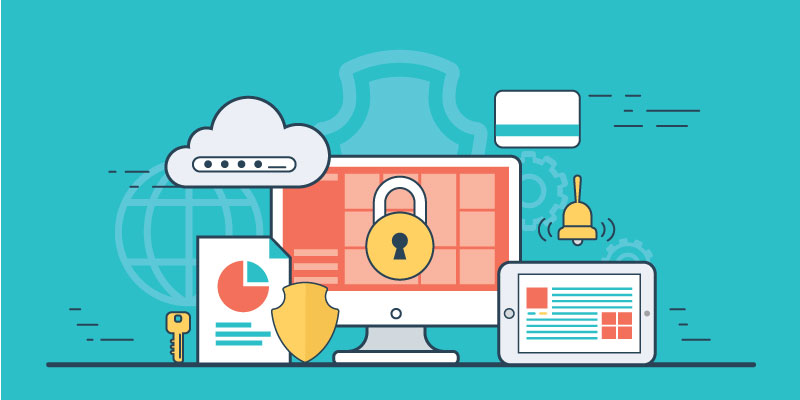
10 Best Website Security Tips for Safe WordPress Website
There are many Content Management Systems. But, WordPress is the most famous CMS, powering over 30% websites. Unfortunately, as it continues to grow, the hackers are now targeting WordPress websites daily. Irrespective of the kind of content your website offers, you all are vulnerable. But you need not to worry as this blog will provide you essential and practical website security tips to secure your WordPress website.
Therefore, your site might get hacked if you have not taken some specific precautions. Every website owner want their website safe from hackers. Therefore, website security is the utmost thing for your WordPress website.
Here are the best Website Security tips to Secure your wordPress website:
1. select a good hosting provider
The easiest means of keeping your WP website safe is choosing a good hosting provider. This is because good hosting provides many layers of security.
There is a high temptation of choosing a cheap hosting provider so that you can save the money and use it elsewhere. But, doing this by all means as it will lead to big issues in the future. Your URL might start redirecting to other malicious websites and all your data gets deleted.
Thus, paying some extra cash for a quality hosting service means your website has extra layers of security. Besides that, good WP hosting increases the speed of your website. That will be a great benefit for WordPress users.
By good luck, there are many WordPress hosting providers to use. For example, WPEngine. This service provider offers multiple security features, such as 24/7 support and daily malware scans. Also, their prices are affordable.
2. update your WordPress version to the recent version
Our next tip from the list of website security tips is that you should develop the habit of always updating your WordPress to a current version. Indeed, developers implement a few changes in every update to make it better. These changes comprise of security features.
Thus, updating your WordPress website to the recent version helps you stay safe from hackers. It becomes difficult for hackers to exploit pre-identified loopholes as a means of gaining access to your site. Likewise, it is essential to update your themes and plugins for security reasons.
Naturally, WordPress performs the automatic download of minor updates. But, you should update all major WordPress updates straight from your WordPress dashboard.
3. use a strong password
Although passwords get often overlooked, they are an essential section of WordPress security. Make sure you are not using plain passwords like 123abc. The reason behind this is that they are easier to guess despite being easier to remember. Actually, experienced users can crack your password with ease and access your website without sweating.
For this reason, you should use a complicated password. Or, a password that is auto-generated as it comprises of special letters, nonsensical letter combinations, and different numbers.

4. avoid using nulled themes
Unlike free themes, the appearance of WordPress premium themes is more professional and provides more customizing choices. As the saying goes by, you always get what you have paid for.
So, premium themes get coded by professional developers, and they get tested to pass many WordPress tests. Above all, you are free to customize your theme as you would like. Regular theme updates and complete support in case anything goes wrong.
However, there exist some websites that offer cracked or nulled themes. Also, cracked or nulled themes are malicious for your WP website. They have hidden malicious codes that may destroy your database and website or even expose your admin login credentials.
Thus, you should avoid using nulled themes to save your cash.
5. disable file editing
WordPress website has a code editor function for editing your theme and plugins during the setup. You can access this function by clicking WP dashboard>> Appearance>> Editor. Alternatively, you can access it by going to dashboard>> Plugins>> Editor.
However, you should disable this feature after setting up your website, and it is live. In case a hacker accesses your WP admin panel, they might add fine but dangerous codes to your theme and plugins. In most cases, this code is nice, and you might not notice any change until things get worse. So, ensure you disable the editing function as it is vulnerable to hacking.
Disabling this feature is easier, as you only need to paste the define (‘DISALLOW_FILE_EDIT’, true); code in your wp-config.php file.
Helpbot is a WordPress support agency which provides proactive WordPress website maintenance and professional WordPress support services to website owners belonging to different business niche. Get 24x7 WordPress support for fixing common WordPress errors.
6. limit login attempts
Naturally, WordPress does not have limitation to attempted login trials. Although this is good for users who have forgotten some letters in their passwords, it exposes you to brute force attacks.
For this reason, you should limit the login attempts so that users can get blocked after attempting to log in several times. This reduces your chances of brute force trials because hackers get locked out from your site before finishing their attacks.
To activate this feature, use any of the best WordPress login limits attempt plugins.

After installing your chosen plugin, ensure you have changed the number of login trials through Settings >> Login limit attempts.
7. install a WordPress security plugin
Regular testing of your WordPress website for security malware is time-consuming and tedious. Further, you might not notice a piece of malware written in your code if you are not updating your coding knowledge. Therefore, installing a WordPress security plugin is an essential website security tip.
Luckily, you do not need the coding knowledge to do so, because developers have developed WordPress security plugins for such tasks.
These security plugins handle the security of your site by scanning for malware and monitoring it 24/7. Among the best WordPress security plugins to use is Sucuri.net. This plugin provides a website firewall, security notifications, after-hack security actions, successful security hardening, and blacklist monitoring. Also, it offers remote malware scanning, file integrity checks, and security activity auditing.
8. change your WP-login URL
“Yoursite.com/WP-admin” is the default WordPress login address. However, leaving this address in default makes you a target for brute force attacks. Hackers try to crack your username and password. Also, if your website has subscription accounts, you might get many spam registrations.
Therefore, you should change your admin URL login or have an extra security question on the registration and login pages to avoid these attacks. Also, you can add a 2-factor authentication plugin on your website for further protection of your login page.
For instance, your password and received text. This security feature blocks hackers from accessing your site. Also, you can examine IPs with the most failed login trials and block their addresses.
9. hide WP-config.php and .htaccess files
Now, the next thing in our list of website security tips is to hide WP-confg.PHP and .HTaccess Files. It is a better procedure for enhancing the security of your website. However, this practice is good if you are serious about the security of your site, as it blocks hackers from accessing these files.
This option should get established by professional developers because it requires you first to back up your website, then go on with caution. In fact, a simple mistake may block you from accessing your site.
Here are the two things you should do to hide these files after backing up the site:
Nonetheless, the procedure is easier, but it requires having a backup of your site and great precaution.
10. install the SSL certificate
Today, all types of websites require an SSL certificate (Single Socket Layer). In the past, SSL was needed to make a website safe for particular transactions, such as processing payments. But, Google nowadays recognizes the importance of SSL and offers sites with an SSL certificate at the search results bar (locked padlock at the start of a URL). Any website that requires sensitive information like passwords and your credit card details must have an SSL certificate.

If the site lacks the certificate, all the data in your web server and user’s browser get delivered in plain text. Thus, hackers can read information. Apart from encrypting information, an SSL certificate makes your website safe. Also, users trust websites with an SSL certificate if they need to provide their information. Therefore, installing an SSL certificate is one of the most essential website security tips.
Although there are premium SSL certificates for use on sites that accept crucial information from users, most hosting providers offer the SSL certificate for free. All you need is to install the SSL on your WordPress website.
summary
Among the most vital parts of a WordPress website security. Hackers can attack your site with ease if your WordPress website security is weak. However, it is not difficult to maintain your WordPress website security by implementing the practical website security tips mentioned above. Are you facing any WordPress security issues? Consult best WordPress Security Services by WordPress Support Agency.
If you have any of the questions, comments, or suggestions about WordPress website security tips, use our comments section below.






